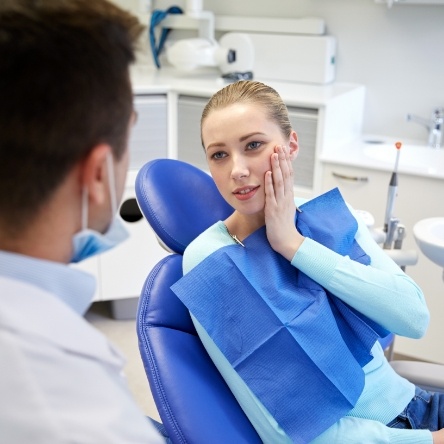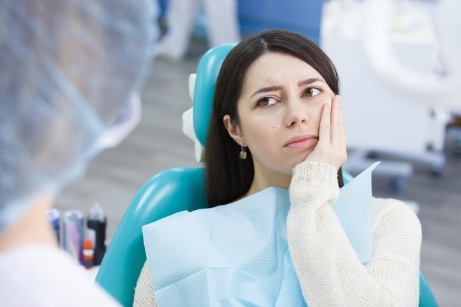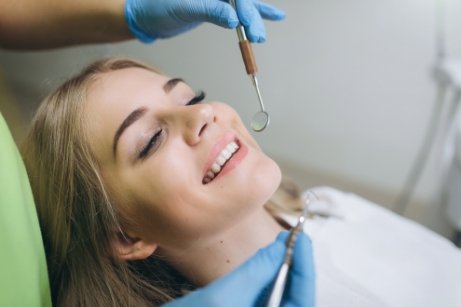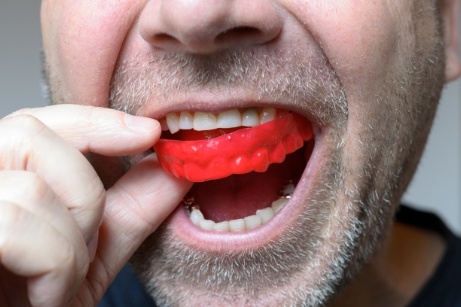Emergency Dentist Mesquite
Immediate Care When You Need It Most

No one expects a broken tooth or severe toothache to pop up and ruin their day, but dental emergencies actually happen all the time. Should you or a loved one need an emergency dentist in Mesquite, take a moment to breathe, calm yourself, and give TrueCare Dentistry a call right away. Our staff will be ready to help over the phone, and we can even schedule you for a same-day appointment if needed. We’ll help you get back to your normal life as quickly as possible!
Why Choose TrueCare Dentistry for Emergency Dental Care?
- Latest Technology Helps Us Find & Treat Issues in Less Time
- Same-Day Emergency Appointments Available for Patients in Pain
- We Can Provide Immediate Care When You Need It Most
The Most Common Dental Emergencies
Whether it is a toothache, a lost crown or filling, a busted lip, or serious jaw pain, the team at TrueCare Dentistry wants you to be prepared to handle a dental emergency on your own until you can reach our office. Although we will do our best to get you in as quickly as possible, you may need to apply appropriate techniques in the comfort of your own home to prevent further damage to your already weakened smile. From dental adhesives to saltwater rinses, below you will find the necessary steps you’ll need to take should a dental emergency arise.
What to Do in a Dental Emergency

- Step 1: Give us a call as soon as you can so we can schedule to see you for a same-day emergency appointment.
- Step 2: Follow our instructions over the phone as one of our experienced team members walks you through how to manage your situation until you can reach us.
- Step 3: See Dr. Rana for an emergency exam, where he’ll focus on evaluating your situation and alleviating any pain you may be in right away.
- Step 4: Review your treatment recommendations, including their estimated length and cost, and work with Dr. Rana to put together a custom treatment plan that works for you.
- Step 5: Get the fast, professional care you need right away whether you need a filling, dental crown, tooth replacement, or something else entirely. You’ll be enjoying a happy, healthy, and pain-free smile again in no time!
Unparalleled Dental Experience & Qualifications

Throughout Dr. Rana’s 15+-year career, he has pretty much seen and done it all in the realm of emergency dentistry, so he’s exactly the type of person you want to see during a stressful situation. He’ll help calm your mind, find the problem, and get to work fixing it right away. To do so, he’ll use some of the most advanced technology available today, helping him quickly find the root cause of any issue.
Understanding the Cost of Dental Emergencies

The cost of your dental emergency in Mesquite will vary based on the types of treatments you need. Because of that, it’s impossible to pinpoint an exact price until you schedule a consultation with our team. It is during your visit that we can evaluate your situation and establish which procedures are necessary to fix the current problem. You may only need antibiotics to take care of an infection, or a severely damaged tooth may require root canal therapy. No matter the result, it’s best to get in and let us assess your situation before it worsens!
Every Dental Emergency Is Different

The only way to know for sure how much your dental emergency will cost is to schedule an appointment with Dr. Rana. During this visit, he’ll examine your oral cavity and determine various factors that must be considered when formulating a cost estimate, such as:
- Where your dentist’s office is located. Those in larger cities will often have higher fees, resulting in you, the patient, paying more for treatment.
- Whether you have insurance. Dental insurance is a great way to save money and take better care of your smile. If we are in-network with your insurance plan, you can save even more money than if you were to see an out-of-network dentist.
- The type of restorative care you will need. No two dental emergencies are the same, meaning the type of care you need will determine how much you can expect to pay out of pocket.
Does Dental Insurance Cover Dental Emergencies?

Most dental insurance plans do offer some form of coverage for emergency dental care. For example, many of them will fully cover one urgent exam per year. In most cases, treatments associated with hurting teeth (i.e., root canal therapy, dental crowns, extractions) are eligible to receive about 50-80% of coverage. Of course, every policy is unique, which is why you should contact your insurance provider to confirm the details of your coverage. Our team is more than happy to help with that step if needed.
Other Options for Making Dental Emergencies Affordable

Don’t have dental insurance? Are you preparing for a more complex dental procedure that is not fully covered by your plan? If so, you can apply for financing through CareCredit. This third-party financier offers low-to-no-interest payment plans to eligible individuals. We also currently have a $19 limited emergency exam that includes your consultation and needed X-rays. If you have any questions about our special offers and how to use them, feel free to give us a call!
Taking Care of Your Smile Can Save You Money

One of the most surefire ways to prevent a dental emergency in Mesquite is by taking proper care of your smile. Practicing good oral hygiene, visiting your dentist regularly, and following a healthy lifestyle can help lower your risk of cavities, decay, and gum disease. As a result, you can save hundreds or even thousands of dollars every year on urgent dental care. It’s also important to remember that the sooner you get in to treat the problem, the less money you’ll spend in the future. Delaying treatment will increase your chances of needing more expensive and invasive procedures down the line.
Keys to Preventing Dental Emergencies

By their very nature, dental emergencies are nearly impossible to avoid with 100% certainty. However, there are a few easy things you can do to drastically cut down on your risk of dealing with a sudden painful problem that requires a visit to an emergency dental office in Mesquite. Keep reading below to learn about five simple precautions that can go a long way toward safeguarding your smile against dental emergencies!
Attend Dental Checkups Regularly

We recommend that most patients, regardless of age, visit Dr. Rana at least twice a year for routine dental checkups and cleanings. These appointments may not seem like a huge priority if your mouth feels fine, but they’re vital in keeping your mouth problem-free. With regular exams, Dr. Rana can catch potential emergencies in their early stages – often long before you would have even noticed anything unusual – and stop them before they cause serious harm.
Maintain a Good At-Home Oral Hygiene Routine

Aside from professional dental cleanings at our office, you’ll need to take excellent care of your teeth and gums at home if you want to prevent dental emergencies in Mesquite. Daily oral hygiene is absolutely essential in preventing the buildup of plaque that contributes to tooth decay, gum disease, and other dental health problems. Make sure that every day, you brush your teeth twice for two minutes each time, and that you floss between your teeth as well.
Follow a Nutritious Diet

The foods and drinks you consume impact your dental and overall health. If your diet contains too many items that are particularly sugary, starchy, or acidic, you’ll have a higher likelihood of cavities, gum infections, and worn-down or sensitive teeth. Such foods and beverages are typically fine now and then, but make sure that your diet primarily consists of nutritious items that benefit your oral health. For example, many fruits contain vitamin C, which encourages healthy gums.
Wear a Mouthguard

Do you play sports regularly or clench and grind your teeth at night? If so, you’ll want to ask Dr. Rana about a mouthguard. These oral appliances fit over your teeth to minimize the risk of severe sports-related injury or chronic wear from nighttime teeth grinding. Better yet, the mouthguards we provide are customized to your unique teeth, making them more effective and comfortable than the cheaply made guards you’ll find in stores.
Don’t Use Your Teeth as Tools
If you’re having difficulty opening a package or bottle, it can be tempting to simply use your teeth to get the job over and done with. However, using your teeth for anything other than chewing food can all too quickly lead to a painful dental emergency. Your pearly whites will be in much better shape if you take the time to grab the right tool for the job instead.
Dental Emergency FAQs
Should I Go to the ER for a Dental Emergency?
Only if you are experiencing any of the following situations should you go to the ER instead of your dentist’s office:
- Broken/fractured jawbone
- Continuous bleeding from the mouth
- Increased swelling that could cause a blockage of the airway
Dr. Rana is trained and skilled at treating all types of dental emergencies and will provide the care you need as quickly as possible. From serious toothaches and chipped teeth to soft tissue injuries and a knocked-out tooth, he can offer start-to-finish treatment in-house, so you don’t have to wait long hours in a lobby or only have your symptoms treated. With Dr. Rana, your oral health and smile aesthetic are in good hands.
What Should I Do If I Experience a Dental Emergency While I’m Out of Town?
The one thing you do not want to do is wait until you return to see a dentist. Instead, contact a local dental professional who can quickly see you and determine the cause of your problem. This will ensure you receive the care you need so that you can continue to enjoy your time away. Just make sure that you call our office and alert us to the situation. If necessary, we will schedule a time when you can come in once you return and let Dr. Rana take a look.
Do I Still Need to See the Dentist If My Toothache Goes Away?
Yes! Just because pain is no longer a concern does not mean there isn’t the possibility of an underlying issue that cannot be seen. Oftentimes, severe problems exist beneath the gumline, making it extremely difficult to identify areas of concern, especially if there are no symptoms.
When faced with any type of tooth pain, contact our office. We will listen to the situation you’re experiencing and determine if it’s necessary for you to receive immediate dental care. Whether it is the same day or the following week, it’s best to let Dr. Rana examine your smile and make sure there are no additional problems.
I Need a Checkup & Cleaning I Need a Dentist for My Child I Have a Cavity or Broken Tooth I am Missing One or More Teeth I Want to Enhance My Smile I Want a Straighter Smile I am Concerned About Bleeding Gums View Our Services
